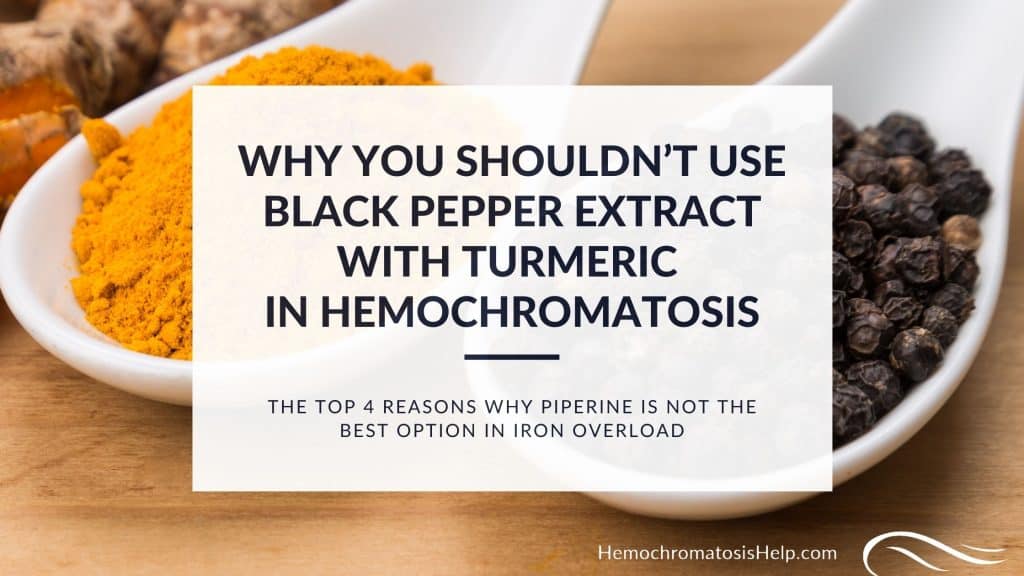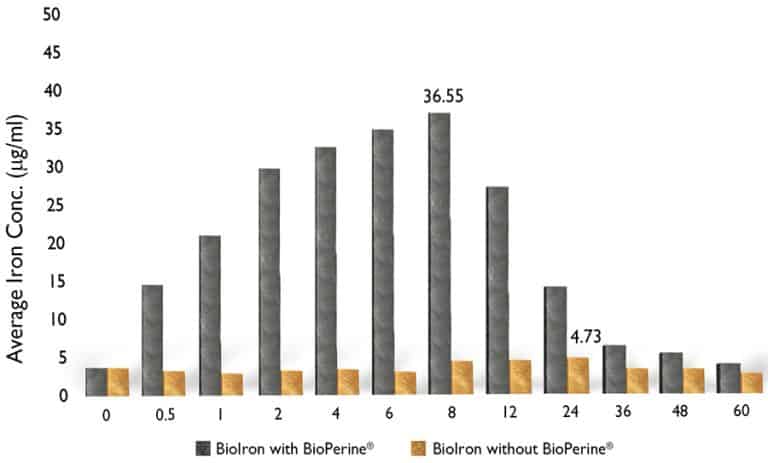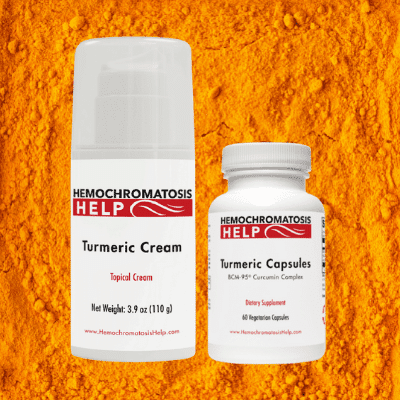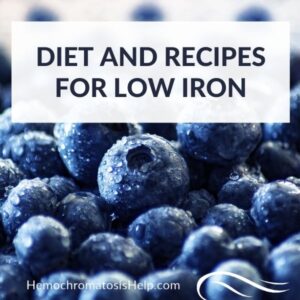Even the best-laid plans of mice and men don’t always work out.
The famous Scottish poet Robert Burns wrote his timeless poem To A Mouse to describe how no matter how well you plan, there is no guarantee of success (while also inspiring John Steinbeck’s most well-known book).
How exactly does this relate to iron overload and nutrition?
Well, it has to do with one of our favorite nutrients that lower excess levels of iron: Turmeric.
We have written extensively about the benefits of turmeric for hemochromatosis and how there is a large body of research demonstrating a ferritin and iron lowering effect of this herbal remedy.
However, one nuance to turmeric is that its absorption is very low when taken by itself. Supplements will often formulate turmeric in ways to enhance its absorption.
An extract from Black pepper known as piperine is a very common addition to turmeric supplements.
A now-famous 1998 study demonstrated that piperine enhanced turmeric absorption by 2000%, which has a major wow factor!
Sounds great! If turmeric is beneficial for iron overload and piperine enhances the absorption of turmeric, well, sign me up!
Right?
In health and nutrition, however, the story usually isn’t so simple.
A further look may show that piperine isn’t necessarily a good choice in hemochromatosis and, in fact, may be harmful to a person with iron overload.
Let’s take a closer look at piperine, or black pepper extract, with respect to hemochromatosis.
In This Article
Original Study on Piperine and Curcumin/Turmeric Absorption
First, there is a fundamental problem when it comes to using turmeric medicinally. The challenge is how to get the turmeric into your body’s cells.
Curcumin, the active ingredient in turmeric, tends to be poorly absorbed by our digestive system. Some estimates place turmeric’s absorption at only about 5%.
Ordinary turmeric powders, pills, or teas, are only going to be used by your body in a tiny amount. Oral absorption of curcumin is generally poor due to its low solubility and instability in the intestinal environment.
So scientists and researchers have been searching for novel ways to get this beneficial herb into a person, to increase that absorption level above 5%.
One frequently-cited study from 1998 is famous for potentially “solving” this problem.
The authors stated:
The medicinal properties of curcumin obtained from Curcuma longa L. cannot be utilised because of poor bioavailability due to its rapid metabolism in the liver and intestinal wall. In this study, the effect of combining piperine, a known inhibitor of hepatic and intestinal glucuronidation, was evaluated on the bioavailability of curcumin in rats and healthy human volunteers.
Concomitant administration of piperine 20 mg produced much higher concentrations from 0.25 to 1 h post drug (P < 0.01 at 0.25 and 0.5 h; P < 0.001 at 1 h), the increase in bioavailability was 2000%. The study shows that in the dosages used, piperine enhances the serum concentration, extent of absorption and bioavailability of curcumin in both rats and humans with no adverse effects.
Studies such as this look like a best-case scenario: highly effective at enhancing the absorption of a powerful nutrient (turmeric) with “no adverse effects.”
Published research and numerous articles online have repeated this 2000% statistic over and over to the point where it is essentially accepted that black-pepper-derived piperine is beneficial for people taking turmeric.
Black Pepper the Spice vs Piperine the Extract
Black pepper extracts of concentrated piperine are not the same as the black pepper you sprinkle on your food.
These studies looking at turmeric and piperine are not using food; they use the extracted, concentrated chemical constituent derived from black pepper.
Unless you’re using large amounts of black pepper on your food daily, the information in this article likely doesn’t apply to the everyday culinary use of black pepper.
The isolated, concentrated ingredient from a plant will typically act differently than how it would if it was whole and intact with all the other components naturally occurring.
The BioPerine website addresses this issue directly: “…the direct intake of black pepper will not help achieve enhanced nutrient absorption…if piperine were to remain captive in the form of raw black pepper, it will take time for its bioavailablity enhancing property to be released. Therefore, a purified extract of piperine is necessary to get the increased absorption.”
Piperine is considered to be only 5-9% of culinary black pepper.
So don’t worry, and enjoy your pepper-flavored food without concern!
The Top 4 Problems with Black Pepper Extract and Turmeric in Hemochromatosis
A deeper look shows a much different story.
Below is a summary of four reasons piperine may be detrimental not only in hemochromatosis but also in general!
When taken as a supplement (either with turmeric or any other herb), piperine has been shown to:
- Potentially increase iron absorption (!!!)
- Promote possible toxic side effects
- Decrease a major pathway of liver detoxification (glucuronidation)
- Have inferior turmeric absorption compared to other formulations
Yikes!
Piperine May Increase Iron Absorption
Well, that heading isn’t something you want to read if you have iron overload!
Piperine may potentially increase iron absorption?!
That’s exactly what the makers of BioPerine® found in two small studies they conducted.
BioPerine® is a patented ingredient supplied by a company named Sabinsa. It is a standardized extract prepared from the dried fruits of Piper nigrum (black pepper) and contains a minimum of 95% Piperine.
In their first study, they gave rabbits iron alone, or iron combined with BioPerine®, and compared the iron absorption levels.
As you can see, the results were quite dramatic!
The addition of piperine to iron increased the iron concentration significantly in the first 8 hours and continued to impact iron concentrations in the test subjects 60 hours later.
Compared to iron supplementation by itself, there was a significant increase in iron absorption when combined with BioPerine®.
They then used the iron with BioPerine® combination in 30 people with iron deficiency anemia. This study showed that iron combined with BioPerine® increased ferritin and iron levels.
The authors wrote:
A significant improvement in serum iron (could be correlated to the immediate release of iron from BioIron into systemic circulation); total iron binding capacity and serum ferritin level was also observed. (source)
The authors concluded that iron plus piperine might be something for those with iron deficiency anemia to consider.
Whoops! That’s the opposite of what we want in hemochromatosis and iron overload.
Keep in mind these studies are very small and represent the only research on this topic, so we hope to see more extensive work to better understand this finding in the future.
However, if you have hemochromatosis and take turmeric supplements with concentrated black pepper extract, I’m afraid this is an example of those best-laid plans…
Piperine May Promote Possible Toxic Side Effects
Despite the study from 1998 at the top of this article claiming that piperine has “no adverse effects,” the research poses more concern for the possible toxicity from an excess amount of piperine.
The authors also state that there are “no adverse effects,” however, if you read the study, you’ll see that they evaluated the rate of turmeric absorption over 4 hours.
This study evaluated the effect in both human volunteers as well as animals. The researchers gave a single dose of turmeric to one group while giving turmeric plus piperine to the other group. The concentration of turmeric was then measured over the course of the next 4 hours.
That’s it. End of study.
Is this research reliable?
Can it really be applied to our nutrient and health care decision-making process?
This certainly seems like a great example of how research can be so confusing at times.
The conclusion that piperine/black pepper raises turmeric absorption by 2000% sure gets the attention and has been quoted by numerous papers and online articles. However, a deeper look at the situation just doesn’t hold up.
Sure, piperine enhances turmeric absorption, but there is no way they can claim that there are “no adverse effects” based upon a study that lasted 4 hours long!
And there is other research that indicates that piperine might not be as perfect as people might think.
Potentially toxic and other side effects seen with piperine include:
- Allergic reactions and heartburn (Invivo)
- High doses are toxic to the GI system, bladder, and adrenal glands (Piyachaturawat, 1983)
- Reproductive effects on animals (Daware, 2000)
- Inhibits T3, T4, thyroid function, and glucose metabolism (Panda, 2003)
- Neurotoxic and promotes oxidation (Unchern, 1998)
It is important to note that most of this comes from animal studies and not human studies. Therefore we must hesitate before we draw conclusions.
However, there are legitimate concerns on how concentrated black pepper extract may affect our long-term health.
The last thing we want to do is “rob Peter to pay Paul.”
In other words, while we want to enhance turmeric absorption, we don’t want to do this at the expense of liver detoxification function, enhanced iron absorption, and other potential long-term effects.
Black Pepper Extract Decreases Liver Detoxification
Speaking of liver detoxification…
Glucuronidation is a significant pathway of detoxification in the liver responsible for metabolizing and excreting many substances from our body.
The glucuronidation pathway detoxifies numerous hormones, nutrients, bile acids, toxins, and medications, exemplifying just how important this process is for our health.
The authors of the original study in 1998 knew of this mechanism of action.
If you re-read the quote at the beginning of this article, they state, “piperine, a known inhibitor of hepatic and intestinal glucuronidation.”
Other research has demonstrated that piperine may impact the metabolism of a wide range of medications.
And an article entitled “Should We Be Weary of Piperine?” quotes research that shows that piperine can reduce glucuronidation by 50%.
It continues:
We all know the importance of biotransformation, or ‘detoxification’. It doesn’t make immediate sense why we would choose to inhibit this pathway, especially if the nutrient we are aiming to increase absorption of (turmeric) is taken to enhance liver function.
Over time, limiting this liver detoxification pathway could potentially lead to health consequences.
Since glucuronidation is one of the most, if not The Most, critical liver detoxification pathways, we prefer not to interfere with it! 🙂
Piperine isn't even the best way to use Turmeric!
After all of this has been said and done, piperine isn’t even the best way to absorb turmeric!
In fact, piperine may have inferior turmeric absorption enhancement when compared to other formulations.
Remember back to all the hubbub about a 2000% increase in bioavailability when combining turmeric with black pepper?
In a paper entitled, “A Pilot Cross-Over Study to Evaluate Human Oral Bioavailability of BCM-95CG (Biocurcumax), A Novel Bioenhanced Preparation of Curcumin,” the authors evaluated the impact of a turmeric formulation called BCM-95® compared to turmeric with piperine.
This study was done on human volunteers and showed that the BCM-95® formula had a greater impact on turmeric absorption compared both to standard curcumin as well as a curcumin-piperine formulation:
The results of the study indicate that the relative bioavailability of BCM-95®CG (Biocurcumax™) was about 6.93-fold compared to normal curcumin and about 6.3-fold compared to curcumin-lecithin-piperine formula. BCM-95®CG thus, has potential for widespread application for various chronic diseases.
The BCM-95® demonstrated an over 6-fold increase in turmeric absorption compared to the piperine version!
Now, this sounds like a better formula for success!
Hemochromatosis Help Turmeric Supplements
For those of you who have been asking for years why we don’t use black pepper extract in our turmeric formulas, well, now you know!
Our Hemochromatosis Help Turmeric Capsules features BCM-95®, the very same ingredient studied above that showed the 6-fold increase in turmeric absorption! This is our preferred way to provide a safe, effective, and well-absorbed Turmeric Capsule that does not interfere with liver detoxification.
To date, BCM-95® is backed by more than 21 published studies and over 12 years of research conducted around the world. Unlike many commercially available curcumin formulas, the bioavailability, safety, and efficacy of BCM-95® curcumin has been demonstrated in numerous preclinical and human studies.
Our other formulation of curcumin, Hemochromatosis Help Turmeric Cream, also does not use piperine. The enhanced absorption from this cream comes from its unique topical application. A topical cream of turmeric gets absorbed directly into the body, bypassing the gut to ensure maximal results.
Both options provide excellent, safe choices for those with iron overload!
Professional Quality Supplements Hand-Picked by the Naturopathic Doctors at Hemochromatosis Help.
Conclusion: Should you use Turmeric with Piperine (Black Pepper Extract) for Hemochromatosis?
While piperine is an example of an ingredient that enhances turmeric absorption, we have elected not to include it in our turmeric remedies because of all the concerns listed in this article.
Some individuals are sensitive to this ingredient.
It may contribute to long-term health consequences by decreasing the critical aspect of liver detoxification called glucuronidation.
There is some emerging evidence that piperine itself enhances iron absorption, which would be the last thing someone with hemochromatosis would want!
Make sure to use high-quality turmeric if you have hemochromatosis, and make sure what you’re taking is not only absorbed but not also causing any harm—the details matter.
Otherwise, your best-laid plans may not work out the way you hope.
Antony B, Merina B, Iyer VS, Judy N, Lennertz K, Joyal S. A Pilot Cross-Over Study to Evaluate Human Oral Bioavailability of BCM-95CG (Biocurcumax), A Novel Bioenhanced Preparation of Curcumin. Indian J Pharm Sci. 2008 Jul-Aug;70(4):445-9. https://www.ncbi.nlm.nih.gov/pmc/articles/PMC2792534/
BioPerine®, Sabinsa, https://bioperine.com
“Black Pepper,” Examine.com, https://examine.com/supplements/black-pepper/
Daware MB, Mujumdar AM, Ghaskadbi S. Reproductive Toxicity of Piperine in Swiss Albino Mice. Planta Med. 2000;66:231–6. https://www.ncbi.nlm.nih.gov/pubmed/10821048
Kesarwani K, Gupta R, Mukerjee A. Bioavailability enhancers of herbal origin: an overview. Asian Pac J Trop Biomed. 2013 Apr;3(4):253-66. PMID: 23620848; PMCID: PMC3634921.
https://www.ncbi.nlm.nih.gov/pmc/articles/PMC3634921/
Panda S, Kar A. Piperine Lowers the Serum Concentrations of Thyroid Hormones, Glucose and Hepatic 5′D Activity in Adult Male Mice. Horm Metab Res. 2003;35:523–6.
https://www.ncbi.nlm.nih.gov/pubmed/14517767
Piyachaturawat P, Glinsukon T, Toskulkao C. Acute and subacute toxicity of piperine in mice, rats and hamsters. Toxicol Lett. 1983;16:351–9. https://www.ncbi.nlm.nih.gov/pubmed/6857729
Prasad S, Tyagi AK, Aggarwal BB. Recent developments in delivery, bioavailability, absorption and metabolism of curcumin: the golden pigment from golden spice. Cancer Res Treat. 2014 Jan;46(1):2-18. https://www.ncbi.nlm.nih.gov/pmc/articles/PMC3918523/
Shoba G, Joy D, Joseph T, Majeed M, Rajendran R, Srinivas PS. Influence of piperine on the pharmacokinetics of curcumin in animals and human volunteers. Planta Med. 1998 May;64(4):353-6. doi: 10.1055/s-2006-957450. PMID: 9619120. https://pubmed.ncbi.nlm.nih.gov/9619120/
“Should We Be Weary of Piperine?,” Invivo Healthcare, https://invivohealthcare.com/archives/should-we-be-wary-of-piperine/
Singh J, Dubey RK, Atal CK. Piperine-mediated inhibition of glucuronidation activity in isolated epithelial cells of the guinea-pig small intestine: evidence that piperine lowers the endogeneous UDP-glucuronic acid content. J Pharmacol Exp Ther. 1986 Feb;236(2):488-93. PMID: 3080587. https://pubmed.ncbi.nlm.nih.gov/3080587/
Unchern S, Saito H, Nishiyama N. Death of Cerebellar Granule Neurons Induced by Piperine Is Distinct from that Induced by Low Potassium. Neurochem Res. 1998;23:97–102.
https://www.ncbi.nlm.nih.gov/pubmed/9482273
Related Articles & Links:
- Using Nutritional Supplements in Hemochromatosis
- Supplements Created for the Hemochromatosis Patient
- Benefits of Quercetin in Hemochromatosis
- Benefits of Resveratrol in Hemochromatosis
- Benefits of Milk Thistle in Hemochromatosis
- Benefits of Green Tea in Hemochromatosis
- Benefits of Calcium in Hemochromatosis







